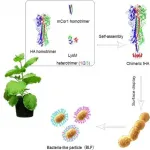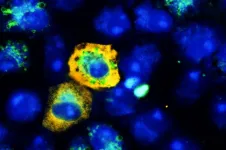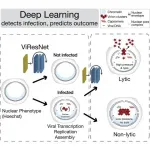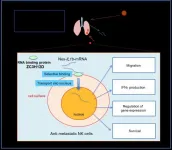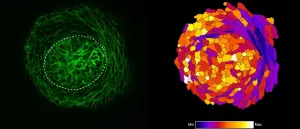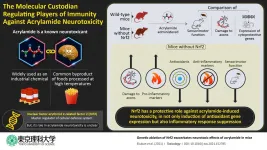Fertility drugs do not increase breast cancer risk, study finds
2021-06-21
(Press-News.org) Drugs routinely used during fertility treatments to release eggs do not increase the risk of developing breast cancer, new research has shown.
Researchers from King's College London, in partnership with King's Fertility, analysed studies involving 1.8 million women undergoing fertility treatments. These women were followed up in studies for an average period of 27 years and had no increase in the risk of developing breast cancer.
The research, published today in Fertility and Sterility journal, is the largest study to date assessing whether commonly used fertility drugs are for a cancer risk for women.
Fertility treatments can range from using medications to boost the release of an egg in a women's natural cycle to more complex treatment such as IVF which involves stimulating a patient's ovarian cycle, extracting eggs from their ovaries, fertilising them with sperm in a laboratory, then transferring the embryo into the womb to develop.
Fertility drugs to stimulate ovaries to release eggs have been used to treat infertility since the early 1960s. Drugs that are used to stimulate the ovaries increase oestrogen hormone production and can act on breast cells. There has been concern that this could turn the cells cancerous, which has led to an uncertainty about the potential risk of infertility drugs causing breast cancer.
The review looked at studies from 1990 to January 2020. Women of all reproductive ages were included in this study and followed up for an average of 27 years following their fertility treatment. 'Researchers found no significant increase in risk to women exposed to treatment versus untreated women, and untreated women who were infertile.
Study author Dr Yusuf Beebeejaun from King's College London and King's Fertility said: "Fertility treatment can be an emotional experience. Patients often ask us if taking ovarian stimulating drugs will put them at increased risk of developing cancers, including breast cancer. To answer that important clinical question, we undertook this review that reports data from nearly 2 million people.''
Dr Sesh Sunkara, senior-author of the paper, from King's College London and King's Fertility said ''Our study showed that the use of drugs to stimulate ovaries in fertility treatment did not put women at increased risk of breast cancer. This study provides the evidence needed to reassure women and couples seeking fertility treatments.''
Katy Lindemann, a patient advocate with lived experience of fertility treatment said: "So much of the fear, stress and anxiety associated with fertility treatment is rooted in navigating uncertainty. This study not only gives patients peace of mind at an emotional level, but also enables us to make more informed decisions about treatment risks and benefits at a rational level."
Dr Kotryna Temcinaite, Senior Research Communications Manager at Breast Cancer Now, said: "Each year around 55,000 UK women get the terrible news that they have breast cancer. We urgently need to learn more about what factors contribute to someone's risk of developing the disease and stop women dying from breast cancer.
"Previously it was unclear whether fertility drugs affect breast cancer risk, and we do receive calls to our Helpline from women who are concerned that their breast cancer has been caused by fertility treatment. While this analysis of existing published studies does provide welcome reassurance that fertility treatment is unlikely to increase breast cancer risk, further long-term and detailed studies are now needed to confirm these findings.
"Anyone seeking breast cancer information and support can speak to our expert nurses by calling our free Helpline on 0808 800 6000."
INFORMATION:
ELSE PRESS RELEASES FROM THIS DATE:
2021-06-21
A study by the University of Liverpool has shown that while asymptomatic COVID-19 testing in Liverpool was popular, significant inequalities were evident between those who got tested and those who didn't.
Published in the journal The Lancet Regional Health - Europe, the study found that 43% of residents aged over 5 years (n = 214 525) took up the offer of free testing for people without symptoms of COVID-19 between 6th November 2020 and 31st January 2021. A total of 1.3% of tests were positive, meaning that 5192 individuals who did not know they had the virus were notified ...
2021-06-21
The avian influenza, an acute viral infectious disease that occurs in poultry such as chickens, ducks, and migratory birds, has been reported to be transmittable to humans. It is difficult to control because it spreads among migratory birds that travel to China, Europe, and elsewhere. Once it is transmitted, it spreads rapidly. Disposing infected livestock is not only costly, but also a cause of serious environmental pollution. This is why vaccines against infectious diseases are imperative. To this, a research team in Korea has recently developed a plant-based, adjuvant-free, recombinant protein vaccine that exhibits a strong immune response.
Professor ...
2021-06-21
Researchers from the German Center for Infection Research (DZIF) at Charité - Universitätsmedizin Berlin and the University of Bonn have examined the way in which SARS-CoV-2 reprograms the metabolism of the host cell in order to gain an overall advantage. According to their report in Nature Communications*, the researchers were able to identify four substances which inhibit SARS-CoV-2 replication in the host cell: spermine and spermidine, substances naturally found in the body; MK-2206, an experimental cancer drug; and niclosamide, a tapeworm drug. Charité is currently conducting a trial to determine whether niclosamide is also effective against COVID-19 in humans.
Viral replication depends on host cell machinery and ...
2021-06-21
A blood test that can detect tiny amounts of circulating cancer DNA may be able to identify risk of cancer recurrence and guide precision treatment in bladder cancer following surgery, according to a clinical study led by Professor Tom Powles from Queen Mary University of London and Barts Health NHS Trust. The findings from the study, published in Nature, may change our understanding of cancer care following surgery.
The study found that patients with urothelial cancer who had a particular cancer DNA marker in their blood following surgery to remove their tumour had a higher likelihood of cancer relapse. These patients could benefit from subsequent treatment with an immunotherapy called atezolizumab.
Globally, ...
2021-06-21
In humans, adenoviruses can infect the cells of the respiratory tract, while herpes viruses can infect those of the skin and nervous system. In most cases, this does not lead to the production of new virus particles, as the viruses are suppressed by the immune system. However, adenoviruses and herpes viruses can cause persistent infections that the immune system is unable to completely suppress and that produce viral particles for years. These same viruses can also cause sudden, violent infections where affected cells release large amounts of viruses, such that the infection spreads rapidly. This can lead to serious acute diseases of the lungs or nervous system.
Automatic detection of virus-infected cells
The research group of Urs ...
2021-06-21
The authors of new research say supporting children and young people's mental health is as important as supporting their academic progress, and that particular attention should be paid to the fact that some young people have struggled more than others.
Findings from their study, published in the Journal of Affective Disorders, focused on the connections between loneliness, social contact, parental relationships, and the mental health of adolescents aged 11-16 during the first full UK lockdown from March to May 2020.
Their analysis drew on self-reported data from 894 young people who each completed a survey throughout to gauge their experiences of lockdown and its effects on their emotions, relationships, and feelings.
The team from the universities of Bath, Bristol, ...
2021-06-21
Hypoxia, or the inadequate oxygenation of a tissue, is a condition occurring frequently in all solid tumours such as melanoma skin cancer. Melanoma cells are not only able to survive oxygen deprivation, but also to use it to their own advantage by hijacking the anti-tumour immune response and developing resistance mechanisms to conventional anti-cancer therapies. A key gene responsible for cancer cell adaptation to hypoxia is HIF-1α (Hypoxia Inducible Factor-1 alpha). Led by Dr Bassam Janji, head of the Tumor Immunotherapy and Microenvironment (TIME) research group at the Luxembourg Institute ...
2021-06-21
A research group led by Professor Sachie Hiratsuka, Institute for Biomedical Research, Shinshu University, has found that a specific sequence of messenger RNA (mRNA), which exists outside cells, binds to receptors on the surface of natural killer (NK) cells and is taken up into the nucleus. The group found that NK cells with mRNA uptake are able to enhance their migration activity and interferon gamma production. Furthermore, NK cells incorporating the mRNA showed an inhibitory effect on cancer metastasis in animal experiments.
In recent years, the results of cancer treatment have been improving with the increase of medical ...
2021-06-21
Helsinki University research group used live tissue imaging for the first time to visualise the emergence of the mammary gland.
Despite long-standing interest, the cellular mechanisms driving the initiation of mammary gland development have remained elusive for decades, mostly due to technical limitations in studying dynamic cell behaviors in live tissues. Recent advances in microscopic methods and availability of various mouse models allowed the research group of Marja Mikkola from HiLIFE Institute of Biotechnology, University of Helsinki to address this question. This is the first time when live tissue imaging has been used to visualise the emergence of the mammary gland.
Mammary gland is the class-defining organ of mammals, yet we know surprisingly little how its ...
2021-06-21
Acrylamide is a toxic chemical compound that affects the nervous system. Not only is it widely used in industries such as paper production, plastics, and wastewater management, but it is also a byproduct of commonly used food processing methods, which makes human exposure to acrylamide inevitable. Therefore, many studies have focused on understanding the toxic effects of acrylamide and our body's response to them. Generally, in response to toxicity, the body's cells release protective factors and antioxidants to remedy the damage. This response is activated by various cellular machinery. One such activator is a protein called "nuclear factor erythroid 2-related factor 2" (Nrf2), ...
LAST 30 PRESS RELEASES:
[Press-News.org] Fertility drugs do not increase breast cancer risk, study finds
